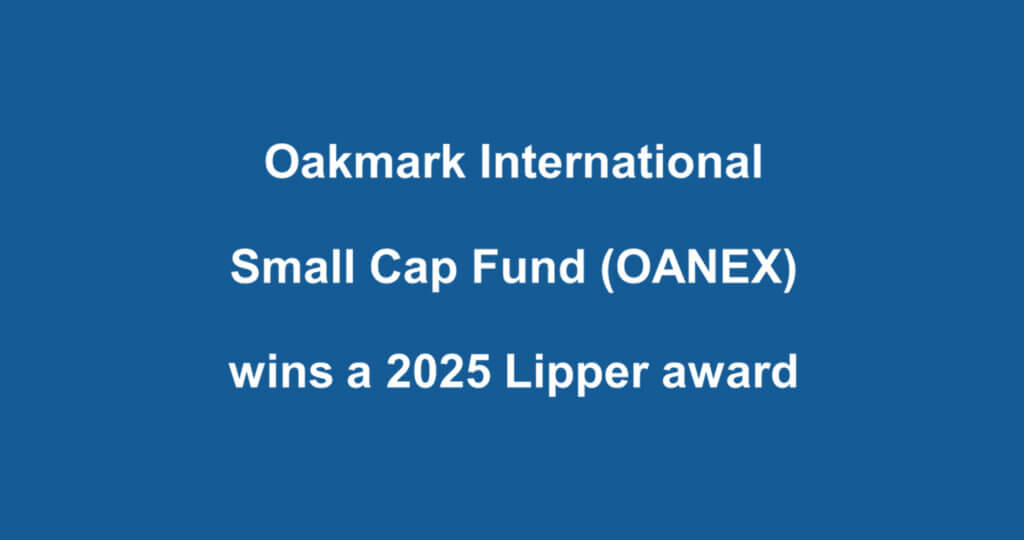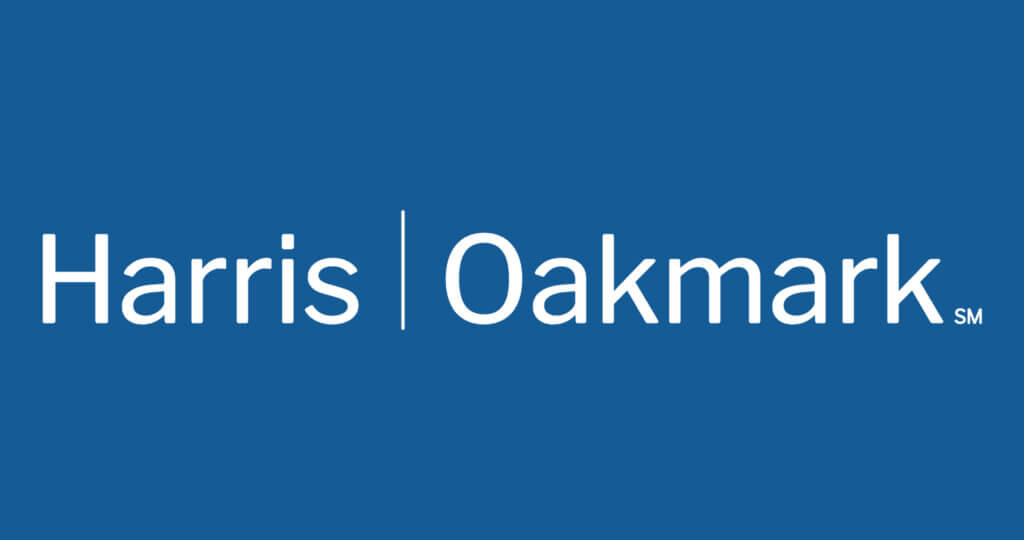Oakmark International Small Cap Fund – Investor Class
Average Annual Total Returns 09/30/18
Since Inception 11/01/95 9.17%
10-year 7.93%
5-year 3.45%
1-year -6.43%
3-month -4.11%
Net and Gross Expense Ratios as of 09/30/17 were 1.36%
Past performance is no guarantee of future results. The performance data quoted represents past performance. Current performance may be lower or higher than the performance data quoted. The investment return and principal value vary so that an investor’s shares when redeemed may be worth more or less than the original cost. To obtain the most recent month-end performance data, view it here.
The Oakmark International Small Cap Fund returned -6.4% for the fiscal year that ended September 30, underperforming its benchmark, the MSCI World ex U.S. Small Cap Index, which returned 3.4% for the same period. Similarly, the Fund underperformed the benchmark for the recent quarter end, returning -4.1%, compared to the MSCI World ex U.S. Small Cap Index return of -0.9% for the period. Since the Fund’s inception in November 1995, it has returned an average of 9.2% per year.
Please know that as fellow shareholders, we are not pleased with these performance results. Our recent Fund performance has been driven primarily by short-term, macroeconomic fears that are not at all indicative of the long-term underlying value we are seeing at company levels. As in the past when we’ve experienced periods of underperformance, we believe the market will eventually recognize the inherent strength that we see in these companies that should result in higher stock prices and better performance. As a reflection of our confidence in our valuations of these franchises, we have been adding personal capital to the Funds over the last several months. Here are some specific details on the Fund’s performance drivers for the quarter and fiscal year ending September 30th.
The top-contributing stock for the quarter was Megacable Holdings, a Mexican cable operator. The company produced strong sales and earnings during the first half of this year, driven by subscriber growth in both internet and video services. Sales were up 14%, while margins expanded over 200 basis points. In addition, Megacable’s corporate segment has also experienced robust growth. Overall, broadband penetration in Mexico remains in the low-to-mid 50% range and we believe the company will continue to benefit from higher penetration in the future.
For the fiscal one-year period, the top-contributing stock to performance was Atea, a Nordic and Baltic supplier of IT infrastructure. This year, the company has reported strong earnings for both fiscal-year 2017 and the first half of 2018. These results were driven primarily by very strong growth in Sweden and significant margin expansion in Norway. Atea’s growth is occurring across both its products and services, with particularly strong demand coming from public sector customers. Also, the legal case regarding the 2015 bribery scandal surrounding the prior management team in Denmark finally came to a conclusion during the period and the company will suffer few direct financial consequences. As a result, Atea has gone through an extensive self-cleaning process and is the only company in Denmark to attain the highest level of anti-bribery certification, which increases our confidence in the investment. Given its broad customer base, the company is well-positioned to grow profitably and it continues to trade at a significant discount to our estimate of intrinsic value.
The largest detractor to the Fund’s performance for the quarter was Travis Perkins, a U.K.-based builders’ merchant and home improvement retailer. The company’s first-half earnings report proved concerning to investors, as Wickes (DIY retailer) reported a 35% year-over-year decline in EBIT, which caused management to reduce its full-year EBIT forecasts for the group by about 3%. The performance at Wickes was a disappointment to us, but Travis’ core merchanting operations (which account for 80% of group EBIT) continue to perform well, despite a challenging U.K. operating environment. Travis’ share price declined approximately 20% following the first-half earnings release, which seems particularly harsh in light of mid-single-digit downgrade to earnings. We used this share weakness as an opportunity to add to our position. Although the company’s near-term demand outlook remains uncertain because of issues surrounding Brexit, we see significant opportunity in Travis because of its best-in-class management team and the likely uptick in U.K. housing transactions over the next three to five years.
The largest detractor from performance for the one-year period was Mitie Group. Mitie is a U.K.-based support services company, providing outsourced cleaning, engineering and security services. Mitie is a restructuring story with new management taking over in December 2016, following a series of operational and accounting issues under the former management team. New management began implementing its turnaround plan in the summer of 2017, and after an initial period of success, progress recently slowed as the company needed to increase expenditures to make further technology investments, hire additional operational managers and improve service levels on existing contracts. Although Mitie’s bottom line has not improved so far in 2018, we believe the business is in a much better position than it was a year ago as evidenced by its improved NPS scores, new business wins and positive third-party feedback from competitors. The company’s recent share price weakness reflects both the company-specific issues we discussed above, as well as sector issues, as seen in the problems of Mitie’s competitors, including Carillion’s bankruptcy and Capita’s trouble raising much-needed capital. With Mitie currently trading at less than 9x forward earnings, we believe it represents a compelling value.
We initiated one new holding in the Fund this quarter: ConvaTec Group, a U.K.-based manufacturer of medical devices and provider of other related services. The company focuses on solutions for ostomy, urology, incontinence and wound care. Products produced by ConvaTec range from antimicrobial and foam dressings to drainage systems and catheters. We eliminated positions in APN Outdoor (Australia), MTU Aero Engines (Germany) and Sabanci Holdings (Turkey) during the quarter.
Geographically, we ended the quarter with approximately 15% of our holdings in Asia, 68% in Europe and the U.K., and 8% in Australasia. The remaining positions are 4% in North America (Canada) and 5% in Latin America (Mexico and Brazil).
We continue to believe both the Swiss franc and Norwegian krone are overvalued versus the U.S. dollar. As a result, we defensively hedged 19% of the Fund’s franc exposure and 23% of the krone exposure.
In closing, we’d like to thank you, our shareholders, for your patience and continued support. As long-term value investors, we will continue to focus on finding attractive, undervalued foreign companies with management teams dedicated to building shareholder value.
The securities mentioned above comprise the following percentages of the Oakmark International Small Cap Fund’s total net assets as of 09/30/18: Megacable Holdings 1.7%, Atea 2.5%, Travis Perkins 3.3%, Mitie Group 2.2%, Carillion 0%, Capita 0%, ConvaTec Group 1.1%, APN Outdoor 0%, MTU Aero Engines 0% and Sabanci Holdings 0%. Portfolio holdings are subject to change without notice and are not intended as recommendations of individual stocks.
The MSCI World ex USA Small Cap Index (Net) is designed to measure performance of small-cap stocks across 22 of 23 Developed Markets (excluding the United States). The index covers approximately 14% of the free float-adjusted market capitalization in each country. This benchmark calculates reinvested dividends net of withholding taxes. This index is unmanaged and investors cannot invest directly in this index.
EBIT is a measure of a firm’s profit that includes all expenses except interest and income tax expenses. It is the difference between operating revenues and operating expenses.
The stocks of smaller companies often involve more risk than the stocks of larger companies. Stocks of small companies tend to be more volatile and have a smaller public market than stocks of larger companies. Small companies may have a shorter history of operations than larger companies, may not have as great an ability to raise additional capital and may have a less diversified product line, making them more susceptible to market pressure.
The percentages of hedge exposure for each foreign currency are calculated by dividing the market value of all same-currency forward contracts by the market value of the underlying equity exposure to that currency.
Investing in foreign securities presents risks that in some ways may be greater than U.S. investments. Those risks include: currency fluctuation; different regulation, accounting standards, trading practices and levels of available information; generally higher transaction costs; and political risks.
The net expense ratio reflects a contractual advisory fee waiver agreement through January 28, 2019.
The discussion of the Fund’s investments and investment strategy (including current investment themes, the portfolio managers’ research and investment process, and portfolio characteristics) represents the Fund’s investments and the views of the portfolio managers and Harris Associates L.P., the Fund’s investment adviser, at the time of this letter, and are subject to change without notice.
All information provided is as of 09/30/2018 unless otherwise specified.








